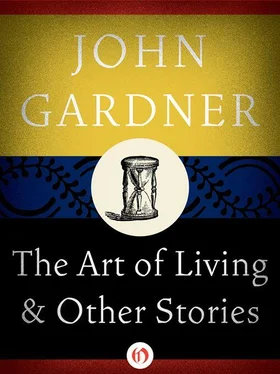It wasn’t pity he felt, or even anger at the general injustice of things; it was bewilderment, a kind of shock that stilled the wits. If he were religious — he was, of course, but not in the common sense — he might have been furious at God’s mishandling of the universe, or at very least puzzled by the disparity between real and ideal. But none of that was what he felt. God had nothing to do with it, and the whole question of real and ideal was academic. Nimram felt only, looking at the girl — her skin off-color, her head unsupported yet untroubled by the awkwardness, tolerant as a corpse — Nimram felt only a profound embarrassment and helplessness: helplessly fortunate and therefore unfit, unworthy, his whole life light and unprofitable as a puff-ball, needless as ascending smoke. He hardly knew her, yet he felt now — knowing it was a he but knowing also that if the girl were really his daughter it would be true — that if Nature allowed it, Mother of tizzies and silences, he would change lives with the girl beside him in an instant.
Suddenly the girl cried out sharply and opened her eyes.
“Here now! It’s okay!” he said, and touched her shoulder.
She shook her head, not quite awake, disoriented. “Oh!” she said, and blushed — a kind of thickening of the yellow-gray skin. “Oh, I’m sorry!” She flashed her panicky smile. “I was having a dream.”
“Everything’s all right,” he said, “don’t worry now, everything’s fine.”
“It’s really funny,” she said, shaking her head again, so hard the soft hair flew. She drew back from him and raised her hands to her eyes. “It was the strangest dream!” she said, and lowered her hands to look out the window, squinting a little, trying to recapture what she’d seen. He saw that his first impression had been mistaken; it had not, after all, been a nightmare. “I dreamed I was in a room, a kind of moldy old cellar where there were animals of some kind, and when I tried to open the door—” She broke off and glanced around to see if anyone was listening. No one was awake. She slid her eyes toward him, wanting to go on but unsure of herself. He bent his head, waiting with interest. Hesitantly, she said, “When I tried to open the door, the doorknob came off in my hands. I started scraping at the door with my fingers and, somehow—” She scowled, trying to remember. “I don’t know, somehow the door broke away and I discovered that behind the door, where the world outside should be, there was … there was this huge, like, parlor. Inside it there was every toy or doll I ever had that had been broken or lost, all in perfect condition.”
“Interesting dream,” he said, looking at her forehead, not her eyes; then, feeling that something more was expected, “Dreams are strange things.”
“I know.” She nodded, then quickly asked, “What time is it, do you know? How long before we get to Chicago?”
“They’re two hours ahead of us. According to my watch—”
Before he could finish, she broke in, “Yes, that’s right. I forgot.” A shudder went through her, and she asked, “Is it cold inhere?”
“Freezing,” he said.
“Thank God!” She looked past him, out the window, and abruptly brightened. “It’s gotten nice out — anyway, I don’t see any lightning.” She gave her head a jerk, tossing back the hair.
“It’s behind us,” he said. “I see you’re not afraid anymore.”
“You’re wrong,” she said, and smiled. “But it’s true, it’s not as bad as it was. All the same, I’m still praying.”
“Good idea,” he said.
She shot a quick look at him, then smiled uncertainly, staring straight ahead. “A lot of people don’t believe in praying and things,” she said. “They try to make you feel stupid for doing it, like when a boy wants to play the violin instead of trumpet or drums. In our orchestra at school the whole string section’s made up of girls except for one poor guy that plays viola.” She paused and glanced at him, then smiled. “It’s really funny how I never make sense when I talk to you.”
“Sure you do.”
She shrugged. “Anyway, some say there’s a God and some say there isn’t, and they’re both so positive you wouldn’t believe it. Personally, I’m not sure one way or the other, but when I’m scared I pray.”
“It’s like the old joke,” he began.
“Do you like music?” she asked. “Classical, I mean?”
Nimram frowned. “Oh, sometimes.”
“Who’s your favorite composer?”
It struck him for the first time that perhaps his favorite composer was Machaut. “Beethoven?” he said.
It was apparently the right answer. “Who’s your favorite conductor?”
He pretended to think about it.
“Mine’s Seiji Ozawa,” she said.
Nimram nodded, lips pursed. “I hear he’s good.”
She shook her head again to get the hair out of her eyes. “Oh well,” she said. Some thought had possessed her, making her face formal, pulling the lines all downward. She folded her hands and looked at them, then abruptly, with an effort, lifted her eyes to meet his. “I guess I told you a kind of lie,” she said.
He raised his eyebrows.
“I do have a boyfriend, actually.” Quickly, as if for fear that he might ask the young man’s name, she said, “You know how when you meet someone you want to sound more interesting than you are? Well—” She looked back at her folded hands, and he could see her forcing herself up to it. “I do this tragic act.
He sat very still, nervously prepared to grin, waiting.
She mumbled something, and when he leaned toward her she raised her voice, still without looking at him, her voice barely audible even now, and said, “I’m what they call ‘terminal,’ but, well, I mean, it doesn’t mean anything, you know? It’s sort of … The only time it makes me scared, or makes me cry, things like that, is when I say to myself in words, ‘I’m going to …’” He saw that it was true; if she finished the sentence she would cry. She breathed very shallowly and continued, “If the airplane crashed, it wouldn’t make much difference as far as I’m concerned, just make it a little sooner, but just the same when we were taking off, with the lightning and everything …” Now she did, for an instant, look up at him. “I never make any sense.” Her eyes were full of tears.
“No,” he said, “you make sense enough.”
She was wringing her hands, smiling as if in chagrin, but smiling with pleasure too, the happiness lifting off as if defiantly above the deadweight of discomfort. “Anyway, I do have a boyfriend. He’s the one that plays viola, actually. He’s nice. I mean, he’s wonderful. His name’s Stephen.” She raised both hands to wipe the tears away. “I mean, it’s really funny. My life’s really wonderful.” She gave a laugh, then covered her face with both hands, her shoulders shaking.
He patted the side of her arm, saying nothing.
“The reason I wanted to tell you,” she said when she was able to speak, “is, you’ve really been nice. I didn’t want to—”
“That’s all right,” he said. “Look, that’s how we all are.”
“I know,” she said, and suddenly laughed, crying. “That really is true, isn’t it! It’s just like my uncle Charley says. He lives with us. He’s my mother’s older brother. He says the most interesting thing about Noah’s Ark is that all the animals on it were scared and stupid.”
Nimram laughed.
“He really is wonderful,” she said, “except that he coughs all the time. He’s dying of emphysema, but mention that he ought to stop smoking his pipe, or mention that maybe he should go see a doctor, Uncle Charley goes right through the ceiling. It’s really that spending money terrifies him, but he pretends it’s doctors he hates. Just mention the word and he starts yelling ‘False prophets! Profiteers! Pill-pushers! Snake-handlers!’ He can really get loud. My father says we should tie him out front for a watchdog.” She laughed again.
Читать дальше












